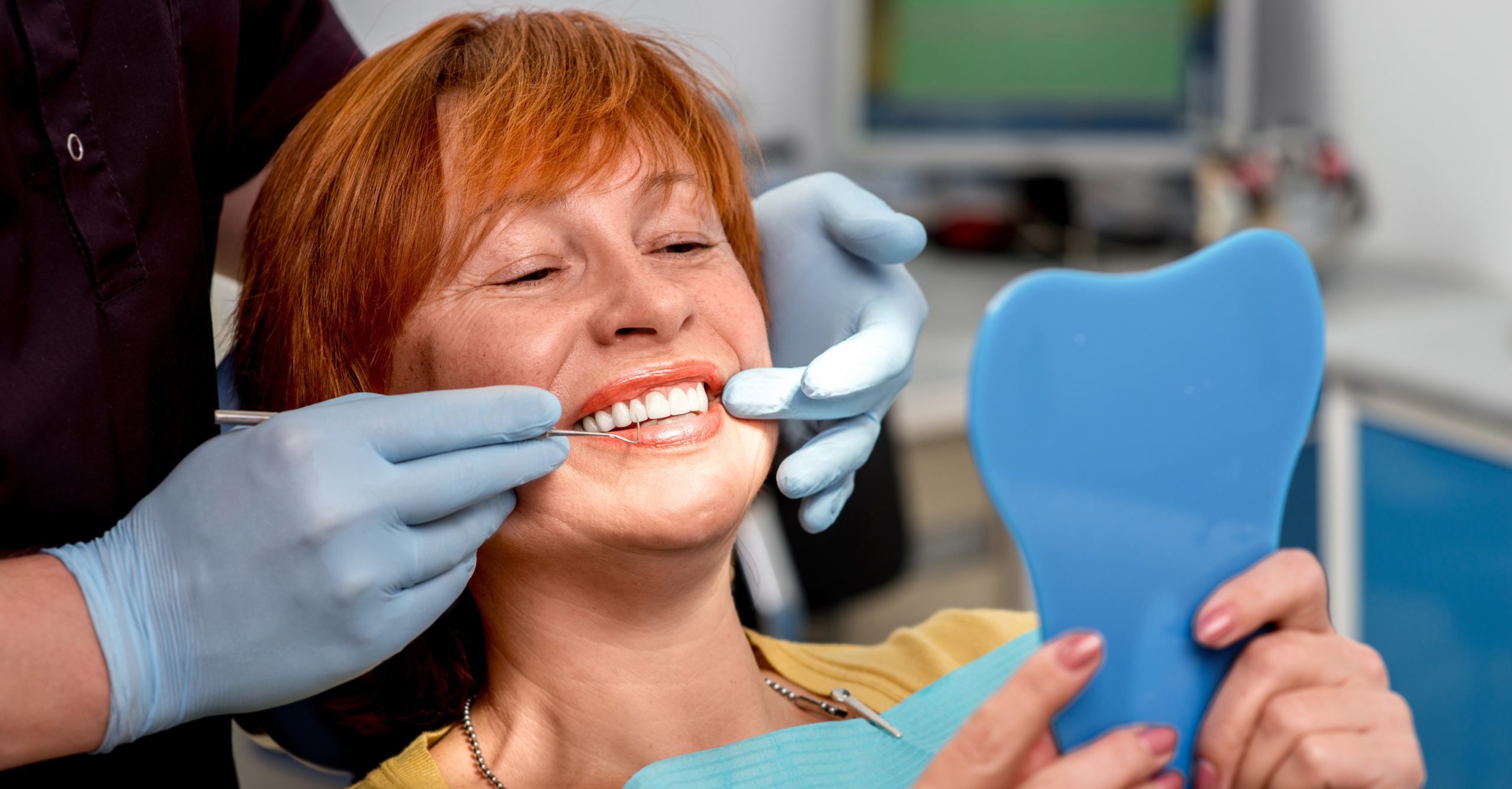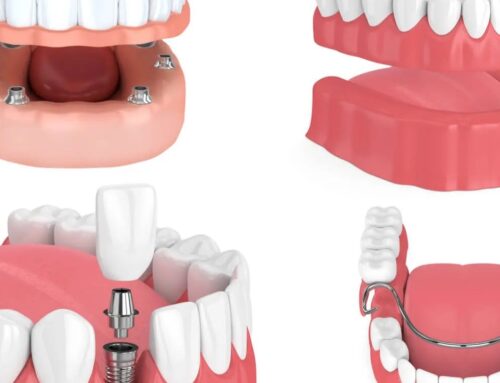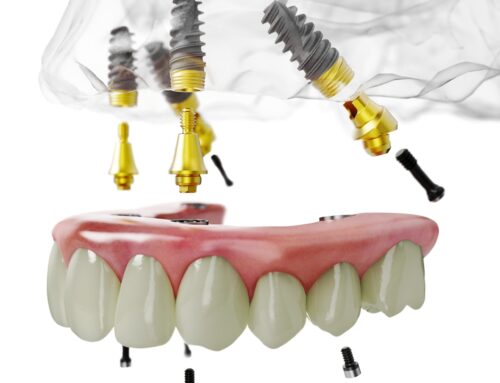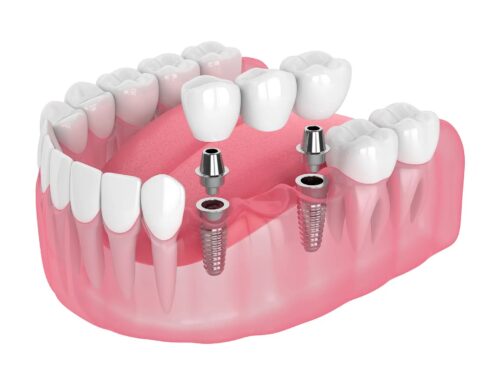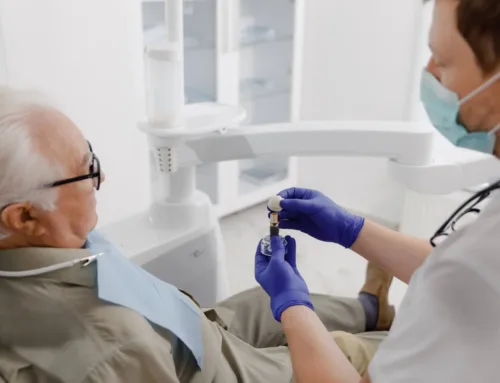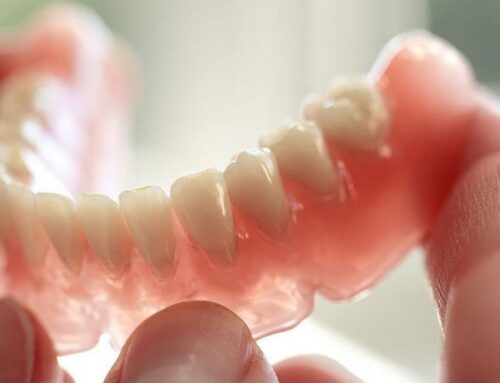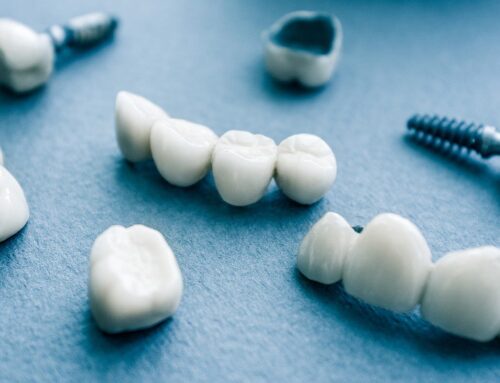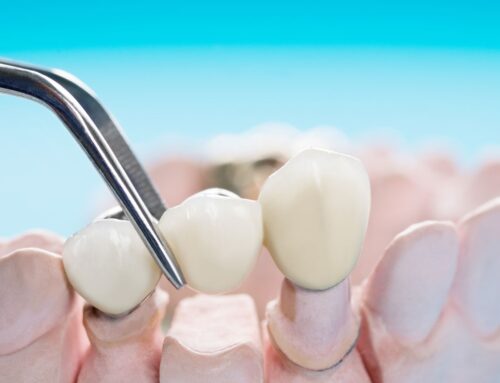Get to Know the All-on-4 Dental Implants One-Day Total Mouth Restoration Procedure
Replacing an entire set of teeth can be necessary in order for the patient to regain full function of the mouth. Naturally, with such a procedure comes many questions, such as how it works and how long it might take. Join us as we answer these questions and learn more about All-on-4 dental implants.
Having healthy teeth is such an important part of our overall state of well-being, and as such making sure you keep your mouth fully functional throughout your life should always be made a top priority. However this presents a significant challenge for many people who have endured an accident resulting in damage or trauma to the jaw, or who have experienced other conditions that may have resulted in lost teeth.
Fortunately, even in cases like these, your dentist has several options to choose from when working to remedy the situation and restore your mouth. One such option is an innovative procedure called ‘All-on-4’, which works to completely replace the entire set of teeth for the patient, on both top and bottom jaws. All-on-4 has become a highly popular option for many patients who are faced with a situation where they have lost several or all of their teeth for any number of reasons.
To help fully explain this procedure, we feel it’s important to review some of the most common reasons why teeth may be lost, as well as the effects that lost teeth can have on a persons’ overall state of health.
Why Do Lost Teeth Occur?
Our teeth are very strong, and are held securely in place by tough tissues and solid bone. Sadly, sometimes this is not enough to ensure permanent retention of all teeth in certain situations. One of the most common reasons for lost teeth is accidental impacts to the jaw. A sudden or intense impact can severely damage the jaw and gums of a person, and can result in the loss of several teeth. While it is possible under certain circumstances to put lost teeth back in place, if the trauma is too extensive or the teeth themselves are cracked or destroyed, then alternative treatments are needed.
In other cases of lost teeth, the cause may be related to another dental health issue, such as gum disease, oral cancer, or advanced stages of tooth decay. In situations such as these, it’s critical to address the underlying cause of lost teeth, in addition to replacing or repairing the teeth themselves. In the most extreme cases, removal of all the patient’s natural teeth may be necessary in order to effectively treat the condition, requiring replacement of the teeth with some form of an artificial set.
Why Is It Important to Replace Lost Teeth?
Replacing lost teeth is extremely important as the absence of teeth in the jaw can have severe long-term negative effects on overall health. First off, missing teeth can make it more difficult to eat and chew food properly, potentially leading to a decline in the quality of the person’s diet and nutritional intake. Furthermore, lost teeth can also affect speech patterns, leading to a loss of self-confidence and detrimental impact to mental well-being.
In addition, missing teeth in the jaw can accelerate the process of bone density degradation. The structural strength of the jaw is largely determined by the presence of teeth to provide stimulation to the area by chewing, which encourages bone growth and improves density. With lost teeth comes a reduction of stimulation, and in turn, a gradual decline in bone strength of the jaw. It is for these multiple reasons that lost teeth should always be addressed as efficiently and effectively as possible.
How Can Lost Teeth Be Replaced?
Replacing individual lost teeth can be achieved with many different procedures. Sometimes, if attended to quickly enough and if the damage is not too severe, the single tooth can be placed back into the jaw to allow for natural healing. In other cases, a dental bridge may be used. Bridges are artificial teeth that are connected to the natural teeth on either side of the gap, and are affixed with a powerful dental adhesive. However, it’s important to note that while bridges offer a replacement of the visible portion of the tooth, they are not designed to replace the root of the missing tooth which would extend down into the gums and jaw of the patient.
For many dentists, the preferred way to replace a lost tooth is through the use of a dental implant. Implants have many advantages over other solutions thanks to the secure and permanent connection of being embedded directly into the bone of the jaw, just like a natural tooth would be. This method helps to address the issue of long-term bone density loss, since the implant works in a virtually identical manner to a natural tooth in the jawbone.
Now, when the problem is not just a single tooth, but multiple lost teeth, other methods are required. The most well-known solution is dentures, which are one-piece replacement teeth that sit on the gums of the patient and are held in place using a denture adhesive. Although they do provide a fix to the problem of lost teeth, dentures are not the most permanent or secure way to do so. It’s also worth reiterating that because dentures do not replace the roots of the teeth, they do not address the potential long-term effects of bone density loss.
Fortunately, there is another alternative, and it is known as the All-on-4 dental implants system. By replacing a full set of teeth and providing a more positive outcome for the patient, All-on-4 is better than dentures in virtually every way.
How Does All-on-4 Work?
Quite simply, the All-on-4 system is a blend of dental implant technology and full-arch dentures which work together to provide the most realistic, natural-feeling replacement teeth with the most solid and secure fit of any tooth replacement method.
The basis of the All-on-4 system, which you can probably surmise from the descriptive name of the procedure, is four specially-designed dental implants inserted into each of the top jaw and bottom jaw. These four implants provide the solid foundation to which a complete, one-piece arch of natural-looking replacement teeth are anchored inside the patient’s mouth. The patient ends up with all of their teeth on each jaw mounted on four secure dental implants, hence ‘All-on-4’.
What Advantages Does All-on-4 Offer?
This short video highlights many of the advantages of All-on-4:
All-on-4 solves many of the most common problems that wearers of traditional dentures often experience. For example, because normal dentures rely on temporary adhesives to keep them attached to the gums, slippage or looseness is possible, potentially resulting in discomfort or embarrassing situations during eating or speaking. Because All-on-4 replacement teeth are physically attached directly to the dental implants, there’s no risk of looseness or worries about them popping off unexpectedly.
The potential for looseness also results in limits on the types of foods that denture wearers can enjoy. Anything that may require additional force to bite or chew could cause denture adhesive to lose its grip, which can be extremely frustrating to deal with day after day, year after year. With the secure and solid connection of All-on-4, patients can enjoy virtually any and all their favourite types of foods with unmatched comfort and confidence.
Lastly, the long-term risks associated with bone density loss from missing teeth are dramatically minimized with the All-on-4 procedure. Thanks to the direct connection between the dental implants and the bone of the jaw, All-on-4 acts much more like natural teeth and provides the stimulation and pressure needed to encourage bones to stay strong and help to retain their density.
How Long Does the All-on-4 Procedure Take to Complete?
When taking all these benefits into consideration, we suspect that you may be excited about the concept of All-on-4, but may have additional questions or concerns about the procedure itself. One of the most common questions people have about All-on-4 is how long it might take to have the procedure done.
Although it may seem like a complex operation, the reality is that once the patient is ready and any underlying dental health issues that may exist have been successfully addressed, the All-on-4 procedure itself can provide a patient with a full set of new teeth in as little as just one day.
The insertion of the 4 dental implants into the top jaw and 4 into the bottom jaw is a straightforward operation. Once these implants are in place the patient will be fitted with a temporary set of replacement teeth while the healing process runs its course to completion. At this point, a short visit to the dentist to have the final permanent replacement tooth appliance attached and inspected is all it takes to be completely finished and ready to enjoy a fully-restored mouth. After that, it’s simply a matter of maintaining your regularly scheduled dental checkups and following an effective at-home dental care regimen.
Don’t Wait to Restore Your Mouth Back to Full Function with All-on-4
If you or someone you love has experienced the loss of multiple teeth, there’s no time to waste in getting the dental care you need to regain a healthy, strong mouth and full set of beautiful teeth. Our team of caring professionals is ready to help you get started down the road to a successful mouth restoration with All-on-4. Contact us now to arrange for your initial consultation and learn more about what the All-on-4 experience will be like for you. We will be glad to walk you through the procedure in more detail and answer any questions or concerns you may have.
Give us a call today, and let us help you get your smile back in style with All-on-4 dental implants!
Appointment Request
If you’re interested in any of our procedures, and would like to meet with one of our dentists to discuss options, costs and get additional information, complete this short form and we’ll give you a call to arrange for a no-obligation appointment at our Barrie clinic.
